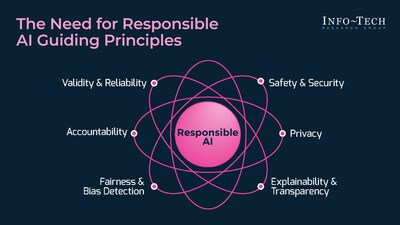Info-Tech Research Group's latest research explores the
ethical integration of artificial intelligence in policing,
offering key strategies to address challenges like data privacy,
bias, and public trust. The newly published blueprint provides
actionable insights that enable law enforcement agencies to enhance
operational efficiency and accountability through responsible AI
practices, ensuring public safety while upholding ethical
standards.
TORONTO, May 17, 2024
/CNW/ - As law enforcement agencies increasingly adopt
artificial intelligence, the urgency of ensuring ethical and
responsible use of AI technologies has never been greater. With
rising concerns about data privacy, bias, and public trust,
Info-Tech Research Group's newly published blueprint,
Responsible Use of AI in Policing, provides a timely and
comprehensive guide for law enforcement leaders. This blueprint
addresses the complexities of AI integration, offering strategies
for data curation, transparency, bias mitigation, and fostering
public trust through stakeholder engagement. By implementing these
practices, agencies can enhance accountability and ensure AI serves
as a beneficial tool in modern policing.

"The responsible use of AI in policing and public
safety is a multifaceted issue that encompasses several critical
areas, including data privacy, safety and security, explainability
and transparency, fairness and bias detection, validity and
reliability, as well as accountability," says
Neal Rosenblatt, principal research
director at Info-Tech Research Group. "Each of these
areas presents its own set of challenges and necessitates specific
initiatives to ensure that AI technologies are used ethically,
effectively, and in a manner that respects individual rights and
promotes public trust."
Info-Tech's blueprint underscores the importance of integrating
AI responsibly in modern policing. By using AI for enhanced data
analysis, predictive policing, and resource allocation, law
enforcement agencies can significantly improve their operational
efficiency and effectiveness. The firm's research promotes a
structured AI implementation approach, prioritizing ethical
considerations such as robust data governance, transparent AI
processes, and active community engagement. These strategies can
help police build public trust, enhance accountability, and achieve
better public safety outcomes.
"The responsible use of AI in policing requires a
comprehensive approach that addresses these critical areas through
continuous improvement, stakeholder engagement, and adherence to
ethical, legal, and societal standards," explains Rosenblatt.
"By tackling the challenges and implementing initiatives
presented in this research, law enforcement agencies can leverage
AI technologies to enhance public safety while respecting privacy,
ensuring security, and promoting fairness and
transparency."
The firm's research details how responsible AI integration can
transform law enforcement practices, emphasizing the necessity for
a seamless and strategic implementation. This process involves
continuous improvements that not only adapt to technological
advancements but also align with public safety objectives. By
embedding AI technologies into core policing operations, agencies
can significantly enhance the accuracy of data analysis, predictive
policing, and resource management. This approach ensures that law
enforcement organizations can keep pace with technological progress
while maintaining ethical standards and improving public trust.
Responsible AI guiding principles are essential for the
development and deployment of AI models that consider human-based
principles. According to Info-Tech's blueprint, without these
principles, the outcomes of AI use can be extremely negative for
both individuals and organizations delivering the AI application.
The research highlights six core principles for IT leaders to
consider for responsible AI implementation:
- Safety and Security – AI models must be secure, safe to
use, and robust, preventing misuse and ensuring operational
integrity.
- Privacy – Individual privacy, personal data, and
relevant regulations must be respected, safeguarded, and complied
with.
- Explainability and Transparency – Predictions and
decisions should be explainable, allowing stakeholders to
understand AI processes and build trust.
- Fairness and Bias Detection – Data must be unbiased to
produce fair predictions and be representative of the population,
addressing potential discrimination.
- Accountability – A person or organization must take
responsibility for decisions from the model, ensuring oversight and
ethical use.
- Validity and Reliability - AI systems should perform
reliably and as expected, maintaining consistency and accuracy in
diverse scenarios.
Info-Tech's blueprint emphasizes the necessity of responsible AI
implementation in policing to enhance operational effectiveness and
public trust. By adopting these guiding principles, law enforcement
agencies can ensure ethical AI usage that respects privacy and
mitigates bias. This approach not only addresses current challenges
but also prepares agencies for future advancements. By investing in
responsible AI practices, law enforcement can achieve sustainable
and impactful improvements, reinforcing their commitment to ethical
standards and community trust in an exponentially evolving
technological landscape.
For exclusive and timely commentary on this topic from
Info-Tech's analysts and access to the complete Responsible Use
of AI in Policing blueprint, please contact
pr@infotech.com.
Info-Tech LIVE 2024
Registration is now open for Info-Tech Research Group's
annual IT conference, Info-Tech LIVE 2024, taking place
September 17 to 19, 2024, at the
iconic Bellagio in Las Vegas. This
premier event offers journalists, podcasters, and media influencers
access to exclusive content, the latest IT research and trends, and
the opportunity to interview industry experts, analysts, and
speakers. To apply for media passes to attend the event or to gain
access to research and expert insights on trending topics, please
contact pr@infotech.com.
About Info-Tech Research
Group
Info-Tech Research Group is one of the world's leading research
and advisory firms, proudly serving over 30,000 IT and HR
professionals. The company produces unbiased, highly relevant
research and provides advisory services to help leaders make
strategic, timely, and well-informed decisions. For nearly 30
years, Info-Tech has partnered closely with teams to provide them
with everything they need, from actionable tools to analyst
guidance, ensuring they deliver measurable results for their
organizations.
To learn more about Info-Tech's divisions, visit McLean &
Company for HR research and advisory
services and SoftwareReviews for software buying
insights.
Media professionals can register for unrestricted access to
research across IT, HR, and software and hundreds of industry
analysts through the firm's Media Insiders program. To gain access,
contact pr@infotech.com.
For information about Info-Tech Research Group or to access the
latest research, visit infotech.com and connect via
LinkedIn and X.
 View original content to download
multimedia:https://www.prnewswire.com/news-releases/ai-in-policing-info-tech-research-group-publishes-guide-for-ethical-ai-integration-for-law-enforcement-agencies-302149226.html
View original content to download
multimedia:https://www.prnewswire.com/news-releases/ai-in-policing-info-tech-research-group-publishes-guide-for-ethical-ai-integration-for-law-enforcement-agencies-302149226.html
SOURCE Info-Tech Research Group